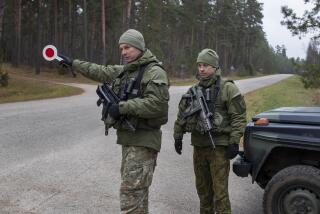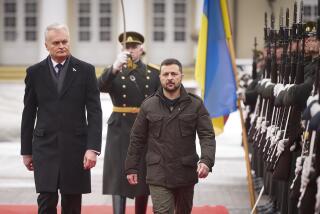Yeltsin Suspends Baltics Pullout : Pressure: President says troops will stay until the rights of Russians in the three former Soviet republics are safeguarded. But his action could jeopardize U.S. aid.
- Share via
MOSCOW — Russian President Boris N. Yeltsin ordered Russian troops on Thursday to remain in the Baltic states until the rights of Russians there are safeguarded--a sudden hardening of Russia’s policy that smacked of Kremlin imperialism to some.
Applying pressure across the board, Yeltsin said economic accords with Lithuania, Latvia and Estonia will be fulfilled only if they cease to discriminate against their Russian minorities, who in many cases have been given the second-rate status of “non-citizens.”
Yeltsin also ordered Foreign Minister Andrei V. Kozyrev to draft an appeal on his behalf to the United Nations that would call on the world at large to help protect the Russians’ human rights.
His decision, made public in communiques released by his press office, was the first concrete manifestation of the more assertive foreign policy that Yeltsin demanded for democratic Russia during a meeting with leaders of the Foreign Ministry two days before.
In naked political terms, Yeltsin’s act should have beneficial fallout at home, where nationalists and reactionaries, groups now on the political upswing, accuse him of having betrayed the millions of Russians who live in other former republics of the Soviet Union.
But the move carries risks, including for the course of U.S.-Russian relations. Congress this month passed a foreign aid bill allocating $417 million to the former Soviet republics; American lawmakers, however, made half of Russia’s share conditional on a troop withdrawal from the Baltic states or on progress in setting a firm timetable.
Eduardas Potasinskas, deputy director of Lithuanian national television, reacted to Yeltsin’s order by accusing him of acting like a czar or a Soviet ruler.
Potasinskas noted that last Sunday, a group of former Communists who want closer ties to Moscow pulled off an upset victory in Lithuania’s legislative election. “And now the Russian, or better to say the imperial army, will remain to prop up the Communists,” he said. “It is all very logical.”
In related decisions also with a political content, Yeltsin ordered steps to improve the often-grim living standards of troops garrisoned in the three small Baltic states, which dictator Josef Stalin occupied in 1940 under a secret protocol with Nazi Germany.
Russia had already announced Oct. 21 that the pullout of its troops would be suspended temporarily because there was nowhere in economically savaged Russia for the disgruntled men and their families to live.
But Yeltsin’s decision was open-ended and accompanied by more varieties of pressure, designed to encourage the Baltic governments to quickly seek agreement with Moscow.
About 130,000 Soviet troops were based in Estonia, Latvia and Lithuania when the Soviet Union collapsed last year and the countries regained their freedom. According to the U.S. State Department, more than 40% of the soldiers have now been withdrawn.
Russia already has an agreement with Lithuania under which all Russian troops are supposed to leave the country by August, 1993. No formal accord has been reached with Estonia or Latvia.
Yeltsin attributed his suspension of the troop withdrawals to his “deep concern over the numerous violations of the rights of the Russian-language population in the specified states,” the communiques said.
Since the collapse of the Soviet Union, the Baltics have hurried to reassert their cultural identity and avoid being swamped by the Russian immigrants, who, in the main, were shipped in during the Soviet period to staff factories and power plants.
Following the Kremlin takeover in 1940, Russians and other Slavs in Estonia increased from 8% of the population to nearly 40%, and in Latvia from 12% to nearly half. Lithuania remained more ethnically homogeneous, but Poles and Russians came to dominate selected regions.
After breaking with Moscow, all three countries wrote citizenship laws that require terms of residency and a language test, which few Russians could pass. As non-citizens, the migrants cannot vote; this month, Estonia conducted national elections in which more than a third of the population could not cast ballots.
In Latvia, non-citizens cannot own property either. Foreign Minister Janis Jurkans, an ethnic Pole, resigned last Tuesday to protest the treatment of his fellow non-Latvians, after unsuccessfully advocating a reduction of the 16-year residency requirement for citizenship to five years.
Yeltsin’s communiques did not specify what steps the Baltics must take to satisfy him that they are adequately protecting their Russian minorities. As for the Russian troops, he gave his government three days to negotiate provisional agreements with the Baltic states to ensure that Russian soldiers have heat, food, electricity and other “social guarantees” as winter begins.
Meantime, President Bush spoke with Yeltsin by telephone Thursday morning to express support for Russian reforms under way, the White House said. It did not mention the delay in withdrawing troops from the Baltic states.
More to Read
Sign up for Essential California
The most important California stories and recommendations in your inbox every morning.
You may occasionally receive promotional content from the Los Angeles Times.










